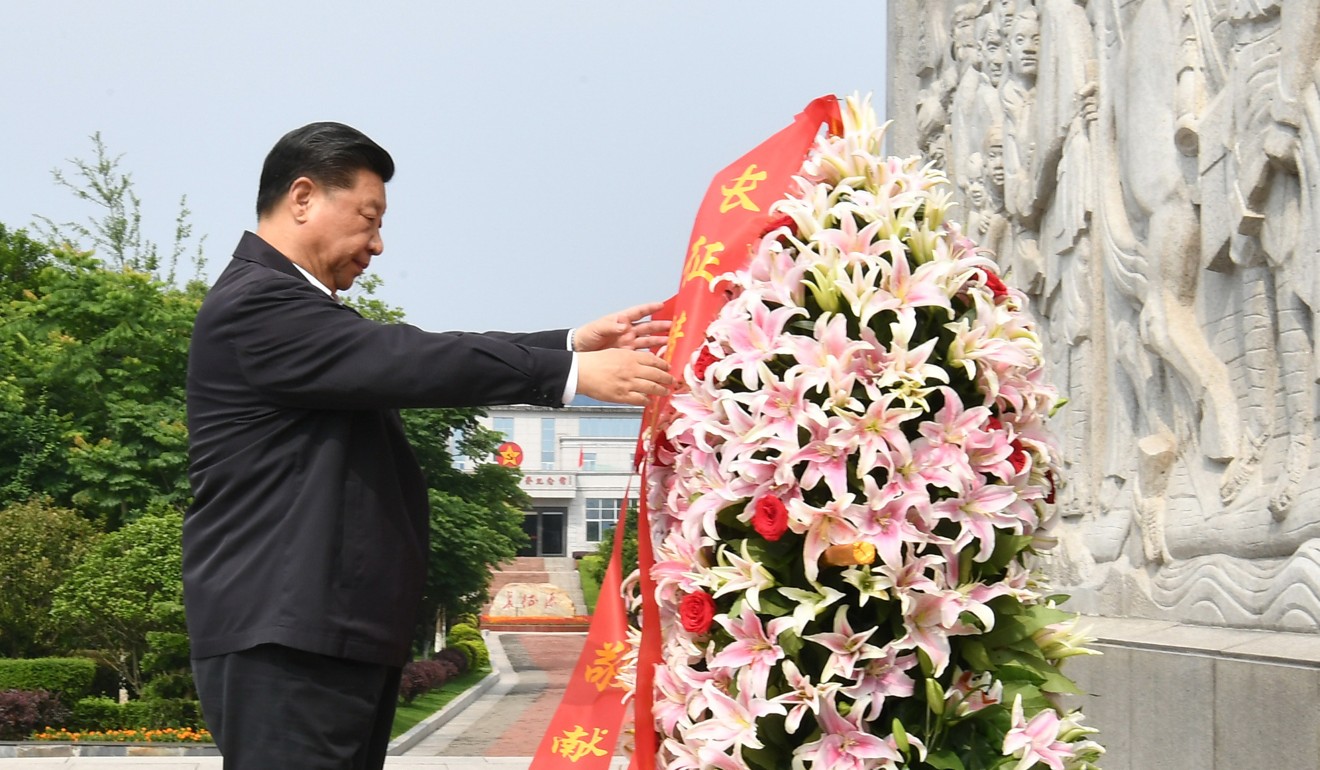Xi Jinping calls for self-reliance as China grapples with long-term US challenge of trade war and ban on Huawei and other technology manufacturers
- Chinese president uses three-day trip to Jiangxi to drive home importance of indigenous technology and resources
- Analyst says two countries could be at odds well after the next decade

Chinese President Xi Jinping has stressed the need for self-reliance and innovation in a rallying call to the country to prepare to fend off various long-term challenges from the United States.
“Technological innovation is the root of life for businesses,” Xi said on Monday on a visit to Jiangxi province, state-run news agency Xinhua reported. “Only if we own our own intellectual property and core technologies, then can we produce products with core competitiveness and [we] won’t be beaten in intensifying competition.”
Xi’s comments, broadcast across the country on Wednesday night, came after US President Donald Trump signed an executive order effectively banning products made by the Chinese telecoms equipment maker Huawei Technologies from the US market.
They also follow a breakdown in the 10 months of trade talks between the two countries, resulting in China and the US trading fresh punitive tariffs on imports.
Xi made the call for self-reliance during a trip to JL Mag Rare-Earth, a major rare earths processing company in Ganzhou, the first stop of his three-day tour of Jiangxi.
In highly weighted remarks, Xi said rare earths had strategic significance and were important to sustainability.
“Rare earths are an important strategic resource, and also non-renewable,” Xi said. “[We] must strengthen technological innovation … and step up environmental protection, and achieve sustainable development,” he said.
While Xi did not mention restricting exports or mining of the minerals, his remarks come amid calls for China to use the resources as a bargaining chip in the technology stand-off with the US.
Jin Canrong, a hawkish international relations specialist with Renmin University in Beijing, has proposed banning exports of all rare earths to the US.
China accounts for 90 per cent of global rare earths production and the minerals are among the few items excluded from the US’ planned tariffs on almost all remaining Chinese goods exported to the US.
The trip was Xi’s first domestic tour since the escalation of the trade war three months ago. Xi was accompanied by Vice-Premier Liu He, China’s top negotiator in the trade talks with Washington and the official overseeing China’s industrial policies.

According to Xinhua, Xi also stressed that China faced an “ever-complicated international environment”, a phrase Beijing has regularly invoked since the trade war erupted in July.
“Our country is still in the middle of a period of opportunity for important strategic development,” he said. “We must keep a clear mind of the long-term and complex nature of all the unfavourable factors from home and abroad, and appropriately prepare for all the possible difficult challenges that may happen.”
In addition, Xi cited the “Long March spirit” during a visit to Yudu county, where China’s defeated Red Army started its fabled Long March in 1934.
“This year is the 70th anniversary of the founding of New China,” Xi said, urging the public to remember the sacrifices made by the pioneers of the Communist Party.
“We must firmly bear in mind where our power comes from and how New China was built so that we treasure all the more the socialism with Chinese characteristics championed by the Communist Party.”
Xi also used speeches during the trip to underscore a number of his policy directives, signalling that Beijing will not compromise on key domestic priorities in dealing with the US. The directives included supporting private and small enterprises, green energy development, social welfare and fighting poverty.
In the past week, Chinese leaders and officials have focused on endurance and the long term, and rolled out various measures to bolster the economy.
The Ministry of Finance introduced new tax breaks for the software industry and chip makers, while the State Council announced that a policy unit had been elevated to a leading group under the central government to spearhead job creation.
Zhang Yansheng, chief research fellow at the China Centre for International Economic Exchanges, a government-affiliated think tank, said China and the US would confront each other for years to come.
“[In terms of US-China trade relations], I think in the next 17 years until 2035, China and the US are likely to keep talking and fighting, and talking and fighting again,” Zhang said.
He said that in the next two years, the two countries would continue testing each other and misinterpreting each other’s strategy.
“And from 2021 and 2025, there will be conflicts between the two countries in trade, finance, the economy and technology. It will be a very difficult period. And from 2026 to 2035, China and the US will gradually put the irrational confrontation [that they had] behind them,” Zhang said.
“If China follows the US standards and rules on all aspects, if it makes China stronger, will the US leave us alone and stop the trade war?” he asked rhetorically.
But Zhang said the two countries would eventually return to respecting a rules-based system to govern global trade and the economy.
“China will do what it takes to meet our goals,” he said.
Additional reporting by Amanda Lee